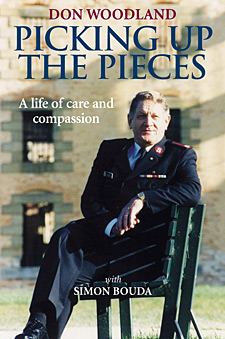Think of any major disaster in Australia in the past 30 years. Salvation Army Lieutenant Colonel, Don Woodland was there.
His mission in life, described in his autobiography, is to instantly and selflessly help people in crisis and trauma the way he thought Jesus would have.
Woodland's involvement in countless crises enabled him to help victims, troops, emergency and other essential service personnel to penetrate that section of society " in the name of Christ. He calls it, helping people "pick up the pieces" of their lives.
 Woodland followed three stages in helping people involved in crises " supplying their immediate material need; dealing with post traumatic stress; and guiding them toward spiritual wholeness. His first approach took him through the fulcrum of national terror " war, cyclone, floods, crashes, earthquakes, massacres, and tsunamis. I was exhausted just reading it!
Woodland followed three stages in helping people involved in crises " supplying their immediate material need; dealing with post traumatic stress; and guiding them toward spiritual wholeness. His first approach took him through the fulcrum of national terror " war, cyclone, floods, crashes, earthquakes, massacres, and tsunamis. I was exhausted just reading it!
Woodland acknowledges the cost that such availability had on him and his family. He admits, "That was my ministry and I wouldn't have it any other way" (p153). His 24/7 availability undoubtedly opened doors and Woodland's integrity in both word and deed commended the gospel to the Essential Services community that he had become a respected and valued member of. Along with many tributes, unofficial and official, he was awarded the Order of Australia Medal in 1996.
The second approach to helping people involved in crises was dealing with their post traumatic stress (PTS). Woodland was affected by PTS from his Vietnam days and in the tradition of a "wounded healer' began seeking answers to the question "Who cares for the carers?'
He helped apply the growing discipline of PTS management in his ministry and was instrumental in the growth of Chaplaincy work in some branches of the Essential Services.
Woodland's approach to dealing with the spiritual issues of people involved in crisis is disappointing. To his credit, he is honest and explicit about his Christian faith throughout the book and at every opportunity he champions the spiritual realm before a sceptical profession. Yet he comes across as a universalist: "Religion is only a means to an end. The essence and gift of life itself is Creator given. Religion is man-made." (p312).
Are the exclusive claims of Christ is in the category of "religion'? Woodland does comment on the power of the cross at fatality scenes, but absent is any explanation of how it fits into eternal healing.
Perhaps Woodland's real-life ministry is more Christ-centred than his book, published by secular Macmillan, because, as he indicates, there is real church-growth as a result his Chaplaincy and the congregational leadership of both he and his wife Bernice.
The book identifies and gives some helpful ways to help deal with PTS. However, missing from Woodland's approach is a biblical framework in which to contextualise disasters and their impacts on people. Missing is a clear description as to how one can find temporal and eternal healing through repentance and faith in Jesus Christ. Yet, if I am ever in a crisis, I would undoubtedly value the helping hand of a "Don Woodland'.























